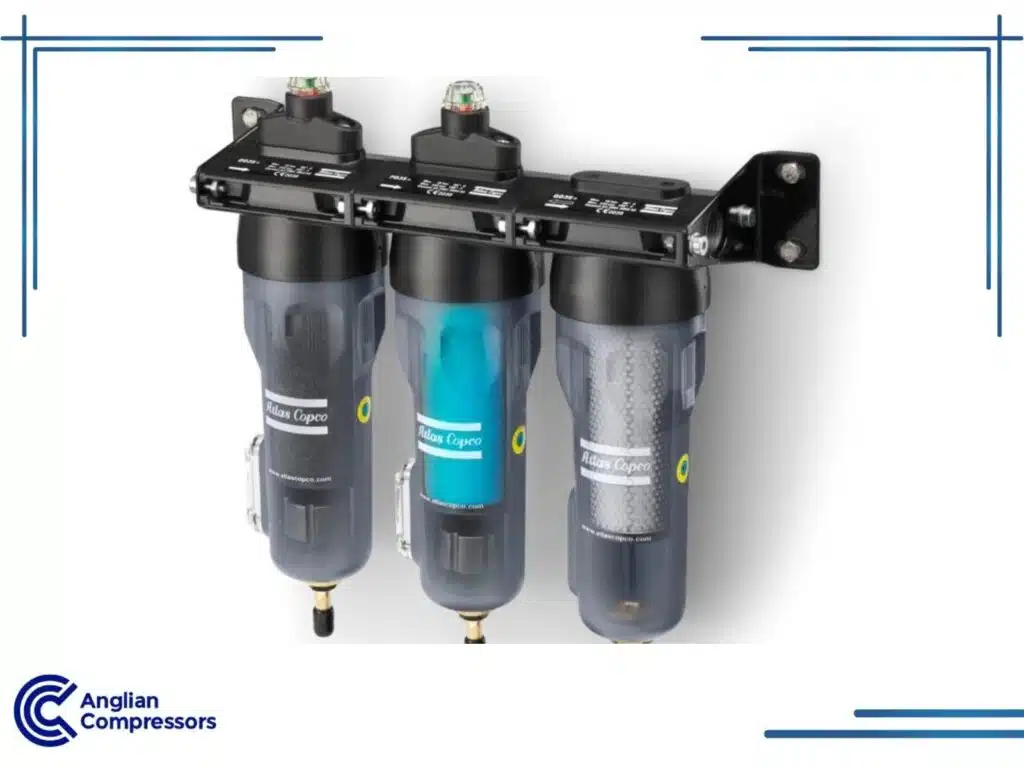What are Compressed Air Filters?
Air compressors use nearby ambient air sources and then compress the air. When the sourced air is unclean, not filtered, and then compressed, any contaminants present are more concentrated.
Compressed air filters are essential components that ensure clean, dry, and safe air for various industrial applications.
An air compressor is an essential tool used in a wide range of industries, such as manufacturing, construction, healthcare, food and beverage processing, and more. For equipment or other machinery where only compressed air will do, dirty air is highly problematic.
Filters are not just an accessory but a necessity to remove contaminants such as particulates, oil, and moisture to achieve cleaner compressed air.
Filters are required to remove various contaminants to achieve cleaner compressed air.
The Importance of Compressed Air Quality Filters
The quality of compressed air has a direct impact on the performance and efficiency of industrial operations. Poor air quality can lead to several problems, including:
- Manufacturing: it’s used to power tools and machinery, operate robots and assembly lines, and finish products. Poor air quality will lead to product contamination, equipment wear, and reduced production efficiency.
- Construction: In the construction industry, it’s used to operate jackhammers, drills, and other power tools. Poor air quality will lead to equipment failure and worker injuries.
- Healthcare: In the healthcare industry, an air compressor is used to operate ventilators, anaesthesia machines, and other medical equipment. Poor air quality will lead to patient infections and other serious health problems.
- Food and beverage processing: In the food and beverage processing industry, high-quality compressed air dryers are used to package and convey food products. Poor air quality will lead to product contamination and foodborne illness.
By investing in high-quality air filters, such as Atlas Copco’s Class 0-compliant systems, industries can protect their equipment, ensure product integrity, and minimise operational costs.
Overall, compressed air quality is crucial for industries that rely on compressed air systems to operate efficiently and produce high-quality products. By investing in quality compressed air filters and other air treatment equipment, businesses can protect their equipment, improve their products, and reduce costs.
How Compressed Air Is Compromised
The process of air compression intensifies what’s already present. In a concentrated form, dirty air quality becomes exponentially more so.
These pollutants are troublesome for all air-fed machinery that factory plants and other business premises depend on. Furthermore, the compression process can introduce additional unwanted elements as well, such as oil.
The main contaminants that plant managers should be wary of are:
- Oil (either as an aerosol or a vapour)
- Dust, Dirt, etc.
- Rust
- Water (either as a vapour or in a liquid state)
Proper filtration and air drying systems are essential to remove these contaminants and protect downstream equipment.
These types of substances might seem innocent enough, but they can gum up the works.
Whether that’s a paint sprayer, grinders, sanders, and other air-fed equipment, they all rely on clean air to operate efficiently. While vital equipment will function for a while, eventually, unclean air will cause a breakdown and a loss of productivity.
How Are Contaminants Measured with Compressed Air?
An air compressor aren’t only reviewed based on its cleanliness. It also matters whether it’s dry and to what degree. This is because moist air, in many ways, is just as harmful to machinery as dirty air is.
For example, the dew point for water is a useful statistic for air moistness. It relates to the temperature when moist air is unable to retain more water. With dirty particles, a cubic metre of air is checked to see how many unwanted particles are present. Similarly, oil is screened as well.
Filtration is utilised with air compressor systems to treat incoming air to address air quality issues.
Filtration systems, paired with air dryers, are used to treat and monitor air quality effectively.
Repercussions of Inferior Compressed Air Quality
The importance of high quality compressed air quality shouldn’t be overlooked.
Poor air quality with inferior filtration (or old filters replaced too infrequently) potentially leads to product issues in manufacturing plants. Healthcare, pharmaceutical production facilities, and the food industry are all examples of where inferior compressed air quality is a potential health issue.
Machinery may eventually break down and need to be internally cleaned. Pneumatic equipment is especially vulnerable to bad air quality fed through the system. Wear on individual parts due to air contamination is also possible. Parts may require replacement before their time.
Do not discount the costs and losses related to machinery downtime, rejected products, and disappointed clients. They add up quickly.
Are There ISO Standards for Air Quality?
Yes, there are. These standards are crucial for figuring out your air quality and making sure all your compressed air systems are at their safest and most efficient. Following these standards ultimately means that all your compressed air tools will have reduced downtime, better product quality, and a longer lifespan for all your equipment.
The current ISO international standard for air quality is ISO 8573-1. It has had three editions and was last reviewed in 2017, but no further updates were applied to the standard.
Quality compressed air requirements are reviewed based on three primary contaminants in compressed air:
1. Oil
2. Water
3. Particulate matter
ISO 8573-1 provides classifications for air purity, ranging from Class 0 (highest purity) to Class 9. Filters that meet ISO standards ensure that air systems meet safety and operational requirements.
Other potential contaminants, such as gases or bacteria microorganisms, might be discovered within the air. However, these aren’t presently considered for testing purposes when businesses are wishing to meet or exceed the ISO 8573-1 standard.
Nevertheless, filters within advanced air compressors may capture additional contaminating solid particles. The standard encourages manufacturers to produce clean air.
Pollutants are measured based on dividing compressed air into cubic metres, then determining whether the air meets the relevant standard classification.
There are different air purity classes to be aware of. It depends on your compressed air application as to which compressed air classification is necessary. Moreover, air compressors do come with an air quality class grade to confirm what’s achievable for the equipment. These directly relate to potential use cases, for instance, medical cleanrooms, oil-free scenarios, or specific product manufacturing, where a certain air purity is necessary.
One thing that’s missing from the ISO 8573-1 standard is recommendations for testing and verifying air filters. Filters help to process air more efficiently. And this is where the newer ISO 12500:2007 ‘Filters for compressed air’ standards come in.
What is Class 0?
Air quality requirements vary depending on various factors. In some critical situations, the maximum air quality required might be necessary. Compressed air classified as Class 0 sets the bar.
Whilst the level of acceptable air particles with contamination is lower than Class 1, it is not contamination free. Air treatment aims to achieve certain levels, rather than a Gold standard. To achieve Class 0, the air compressor, fitted air filters, and dryers must all be capable of Class
Atlas Copco’s Class 0 compressors ensure compliance for critical industries like food and pharmaceuticals.
ISO Standards for Air Filters
ISO 12500:2007 is a newer international standard to cover compressed air filters (within a compressed air system) to establish expected testing and appropriate maximum pollutant levels.
This standard is split into multiple parts, relating to Oil Aerosols, Oil Vapours, and Particulates.
Coalescing filters are testable under this standard to help manufacturers and end users know whether they meet the level required by air compressors to deliver clean enough air quality.
Both ISO 8573-1 and the newer ISO 12500:2007 work in unison, rather than one acting as a replacement for the other.
Types of Compressed Air Filters
There are three main types of compressed air filters to choose from:
- Particulate Air Filters: Remove dust and harmful particles. Often used after an adsorption dryer like a desiccant dryer.
- Activated Carbon Air Filters: Used for removing gaseous contaminants like odours and vapours. Commonly used in food processing, where it’s important to have clean, odourless air.
- Coalescing Air Filters: Remove liquids like water and oil aerosols. They also catch particulates and are versatile but not very energy-efficient.
Choosing the Right Air Compressor Filters
When choosing a compressed air filter, it is important to understand the specific requirements of your industry. For example, an auto shop will have different air quality needs than a food processing plant.
Here are some tips for choosing the right compressed air filter:
- Consider the type of contaminants that you need to remove.
- Determine the required flow rate and pressure drop.
- Select a filter that is compatible with your existing compressed air system.
- Factor in the cost of the filter and the replacement elements.
High-quality filters, such as those from Atlas Copco, ensure reliable performance and long-term efficiency.
If you are unsure which type of filter is right for you, then contact us and let us consult you for free!
It is also important to avoid over-filtering. Over-filtering can lead to unnecessary costs without any additional benefits.
High-Quality Air Filters are Key
Compressed air filters are designed to let air flow through them while capturing unwanted substances. Filtering inevitably results in cleaner air quality. Multiple filters might be utilised depending on the equipment, each expressly designed to filter for something specific.
Also, in some scenarios, like wanting as little oil as possible in a compressed air system, an oil-free compressor may be used.
A coalescing filter is useful to separate oil and water particulates in liquid form. Oil vapour is trickier to remove with oil filters than in aerosol form and requires a different filter, with activated carbon air filters for better absorption.
When the compressed air must meet a more stringent standard, then filters may be finer, or multiple different filters employed to improve air system results. However, there is a knock-on effect with higher clean air requirements.
Finer filters create a high pressure drop as a direct result while enhancing compressed air purity. Because they’re designed to catch more contaminants, filters reach the end of their useful life much sooner. As a result, higher maintenance costs arise because frequent filter replacement is required. Nevertheless, lower operational costs due to fewer breakdowns compensate for this expense.
Other technical factors, such as nominal flow and a larger capacity threshold, play a part too. A higher pressure drop becomes something to manage based on the air pressure rating needed vs compressed air volumes required.

Maintenance and Replacement
Compressed air filters need to be replaced at least every 12 months, or more frequently depending on usage and air quality requirements.
If filters are not replaced regularly, they can become clogged with contaminants. This can lead to a number of problems, including:
- Increased pressure drop: Clogged filters cause a greater pressure drop, requiring more energy to compress the air. This can lead to increased energy costs.
- Reduced airflow: Clogged filters can restrict the airflow, which can impact equipment performance.
- Equipment breakdown: Clogged filters can also lead to equipment overheating and breakdown.
In addition to replacing filters regularly, it is also important to inspect them just as often for signs of damage or wear. If a filter is damaged or worn, it should be replaced immediately.
Keeping a maintenance log ensures filters are replaced on schedule, preventing costly downtime.
Here are some tips for maintaining and replacing compressed air filters:
- Inspect filters regularly for signs of damage or wear.
- Keep a filter replacements log to ensure they are replaced on schedule.
- Use high-quality replacement filters to ensure that your compressed air system is properly protected.
- Regularly do air treatment to improve the quality of the air circulating around the compressor system.
By following these simple tips, you’ll protect your equipment, improve its performance, and extend its lifespan.
Air Dryers to Remove Moisture Levels
Removing moisture from compressed air safeguards equipment and provides for other use cases.
It is necessary to employ refrigerant dryers for the Class 4 standard (a pressure dewpoint of 3 centigrade or lower). Yet, for a lower class with reduced moisture levels, adding an adsorption dryer becomes necessary to achieve a lower pressure dew point.
It all depends on how clean the compressed air must be.
Selecting the right dryer depends on the required air purity level and operational needs.
Conclusion
Understanding and maintaining your filters is essential for businesses that rely on compressed air systems and tools. Choose the right air filters and maintain them properly for significant cost savings and efficiency gains. Air compressor filters are essential investments whenever dealing with compressed air.
By investing in quality filters and implementing proper maintenance, businesses can enhance efficiency, reduce downtime, and protect critical equipment.
Talk with Anglian Compressors About Your Air Quality Needs
To better understand what your business requires, Anglian Compressors are happy to consult with you, and assist in identifying what is best suited for your specific site.
To learn more about your air quality needs and how Anglian Compressors can help, contact us for a personalised air quality assessment.


